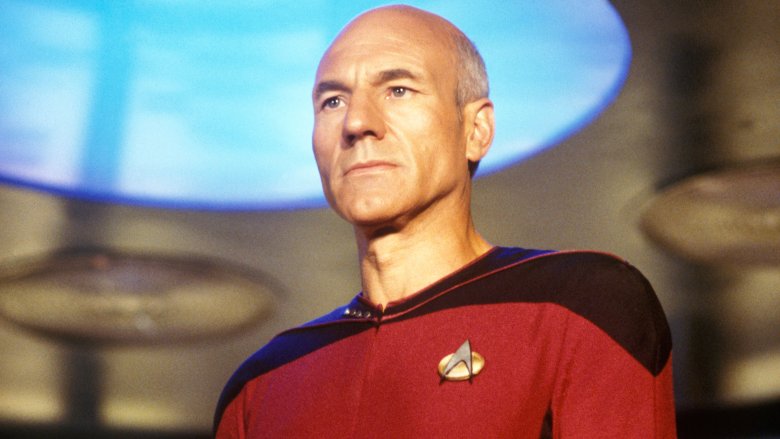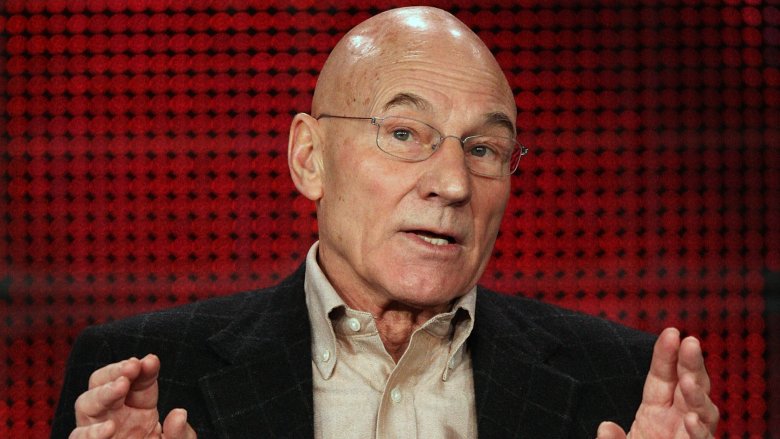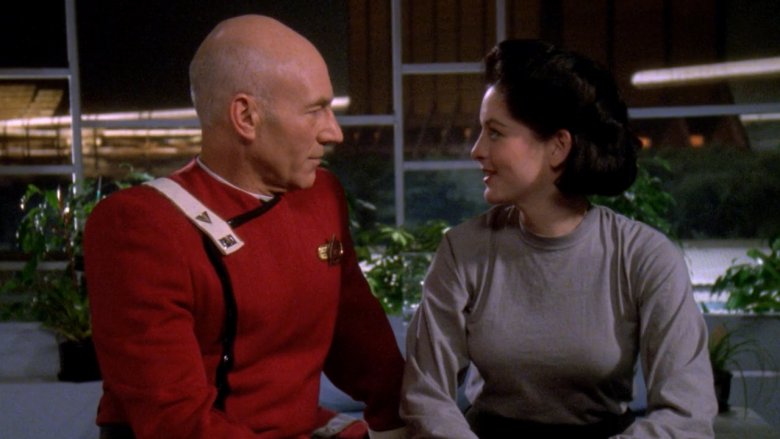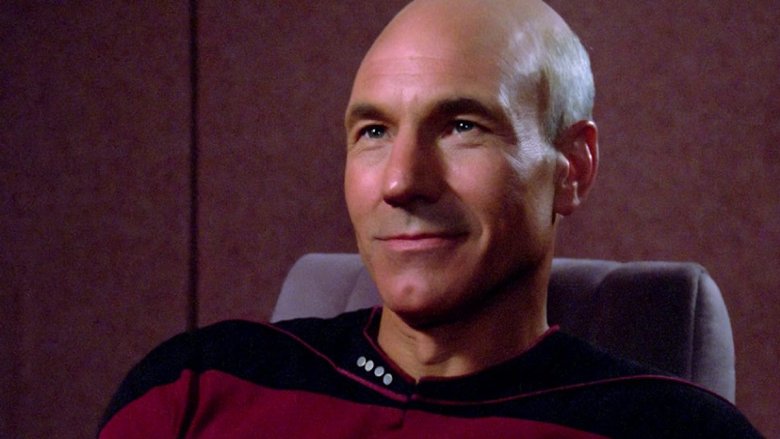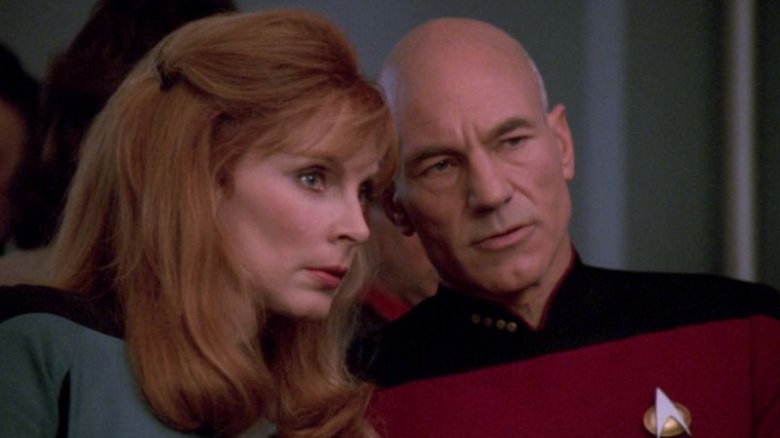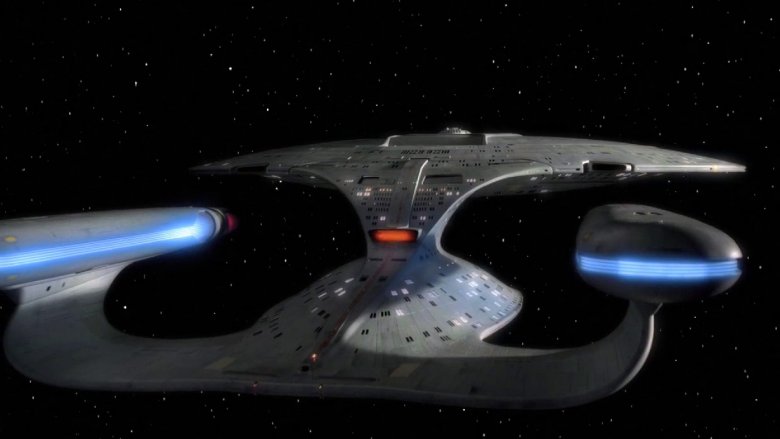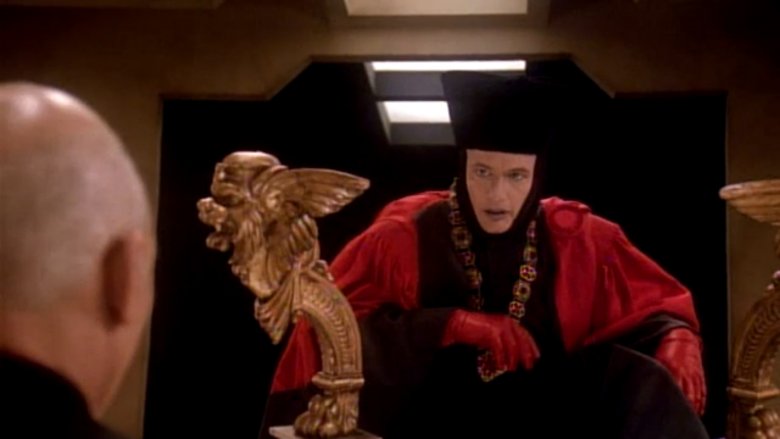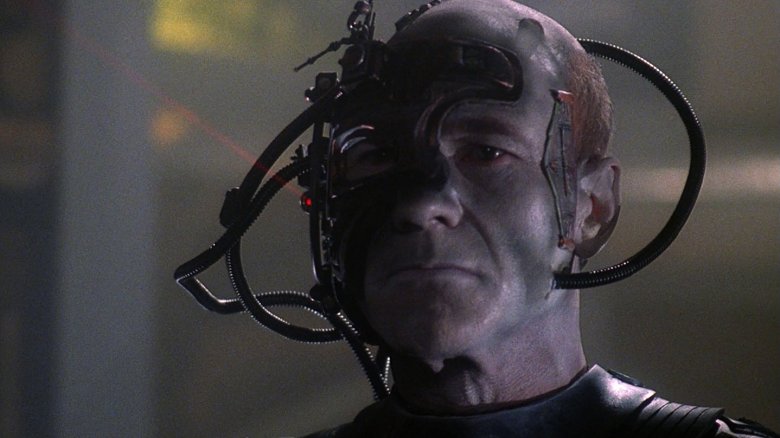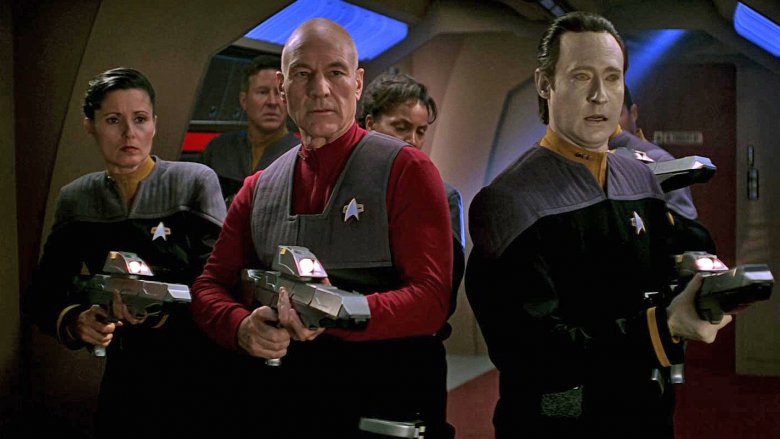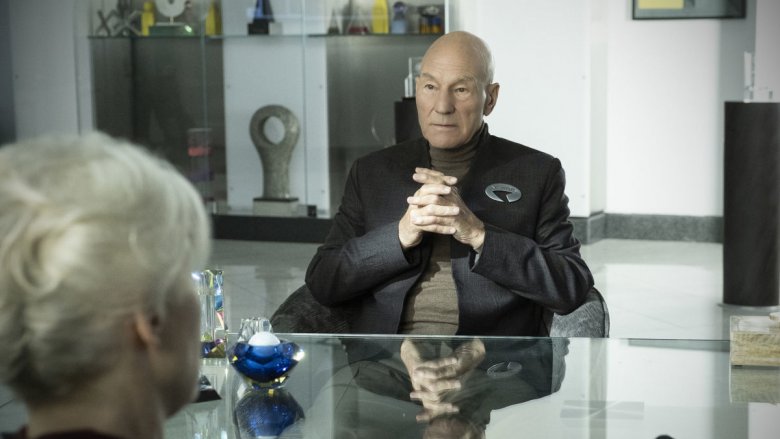Captain Picard's Backstory Explained
Gene Roddenberry had a very specific vision for the future when Star Trek debuted in 1966. Roddenberry saw a world in which the best of humanity gathered regardless of race or gender to explore the unknown adventures of the universe, but the intrepid crew of the Enterprise led by Captain James T. Kirk could only do so much to turn the franchise into the phenomenon it remains today. For that, it took a new generation of heroes and a new captain to lead them.
Star Trek: The Next Generation premiered in 1987 to boldly go where only one show had gone before. At the helm of the Enterprise-D was the immeasurably capable and moral Jean-Luc Picard. The character would go on to not only lead his crew on countless adventures for seven seasons, a handful of movies and a spinoff, but would also solidify Roddenberry's vision of a future in which anyone can see the wonders and horrors of the universe, provided they make themselves the very best the human race has to offer.
Right out of the box, Picard is introduced as a decorated Starfleet Captain and all-around well-educated and erudite man. Gone was the rough-and-tumble Kirk, replaced now with a gentle-but-stern leader that seemed by all accounts to be a quintessential "good guy" through and through. Unfortunately, being introduced to Picard as such a storied character from the get-go meant that his history was easy to lose in the shuffle. At long last, we're here to face that oversight head on with Captain Picard's backstory explained. Engage!
Picard's early character development
To understand Picard's backstory, it's both necessary and fun to know a bit about the character's inception.
Roddenberry was initially against casting Patrick Stewart in the role. After the success of the original Star Trek, producers didn't want to stray too far from Captain Kirk. As a result, actors like Mitchell Ryan, Stephen Macht and Yaphet Kotto were considered; Roddenberry shared the network's vision for a harder-edged type, but reluctantly agreed to audition Stewart.
When auditioning, Stewart wore a hairpiece and spoke with a French accent, which went over about as poorly as one might expect. Assuming he hadn't won the part, he was on his way off the lot when he was stopped by Roddenberry, who'd seen through the rough edges of the audition and called him back. As former President of Paramount Network Television John Pike states in William Shatner's Chaos on the Bridge, Roddenberry dismissed concerns over Stewart's baldness by saying "Hair doesn't mean anything in the 25th century."
With the deliberate choice to make the new captain nothing like the old one, The Next Generation forced audiences to understand that what was being sold to them was not a formula for a science fiction series, but a world in which humanity travels space to better itself, people of color are represented, new species are greeted with diplomacy and a bald man can be the coolest guy in the galaxy.
How Picard was born and raised
Jean-Luc Picard was born in La Barre, France on July 13, 2305, to parents Maurice and Yvette Picard. He and his older brother Robert grew up working on the family's vineyard. It is revealed in the TNG episode "Family" that Jean-Luc's father taught them classic ways of life and avoided technology. While Robert followed in his father's footsteps, Jean-Luc had bigger dreams among the stars.
It will not surprise fans to learn that as a child, Jean-Luc could be described as an overachiever. He was class president, valedictorian, and an athletic champion. His propensity to gravitate toward higher expectations and standards for himself made him the perfect type of person for a career in command — but doomed him to be a pretty lousy brother and son.
An avid space and aviation fan, young Jean-Luc spent his time building starship models and looking at early builds at the Smithsonian Institution. However, his dreams of joining Starfleet were difficult on the family as Maurice and Robert wanted him to work on the vineyard and continue the family business. As shown in the episode "Bloodlines," Jean-Luc's father resisted his son's passion for space exploration and would not condone a career outside the vineyard up until his death.
However, Picard would later reveal that his father's lack of approval didn't stop him. In fact, he was never really motivated by family at all. His one and only passion and goal would always remain Starfleet.
Picard's time as a cadet
By all accounts, Picard was a consummate Starfleet cadet... once he got into the Academy.
When his protege, Wesley Crusher, failed his entrance exam in the episode "Coming of Age," the Captain confided in him that he too failed on his first attempt. However, after getting in on his second try, Jean-Luc became the most exemplary young cadet of his class, often collecting accolades in academics and athletics. He gained notoriety when he pinned a Ligonian in a wrestling match faster than anyone had ever seen. However, his most noteworthy achievement might have been becoming the first freshman to win the Starfleet Academy marathon.
In rare moments when Jean-Luc did stray from the right path, he was helped back to his senses by the Academy's groundskeeper, Boothby. After carving a set of initials into Boothby's prized elm, Picard learned the affection that can come when a tough-as-nails mentor holds you accountable. In fact, when Crusher eventually passed his exam as well, Picard's first piece of advice was to seek out Boothby upon arrival at the Academy.
Despite an exemplary academic record, Picard's promising career nearly ended before it started when the headstrong ensign picked a fight with three rather large Nausicanns in a bar. Although he fought well, Picard was stabbed through the heart, forcing him into emergency surgery for an artificial replacement. In the episode "Tapestry," Picard came to understand that getting stabbed was a formative experience, allowing him to take more risks given the brevity and fragility of life. He was ready for the dangers of command from the start.
The Picard Maneuver
Armed with a new ticker, Picard was given dozens of assignments before landing on the USS Stargazer. Although the Enterprise would be his greatest love, it's revealed in the episode "The Battle" that the Stargazer was his first.
He assumed command of the vessel when its previous captain was killed on the bridge. He led the ship and its crew on many missions alongside his friend Jack Crusher, but ultimately had to abandon his ship when an unknown vessel, later revealed as a Ferengi ship, attacked. Because they couldn't classify the combative ship at the time, the Stargazer took a serious and critical beating in what would later become known as the Battle of Maxia.
Thinking quickly, Picard ordered a jump to warp speed, but only for a short distance. The result made it look like his ship was in two places at once. The Ferengi fired on the wrong one, allowing Picard to position his ship next to theirs and destroy it. Starfleet textbooks would later call this move the Picard Maneuver. Despite the accolade, Picard referred to the tactic as "what any good helmsman would have done."
The battle took a toll on the Stargazer, and Picard had to let it drift in space and spend weeks in emergency shuttle crafts until he and his crew were rescued. Although he lost the ship, he used it to quickly jump to the rank of Captain.
Picard's relationship with the Crusher family
Picard befriended Jack Crusher and his fiancee, Beverly Howard, as a junior officer. Jack and Beverly would go on to get married and eventually have a son, Wesley. The group remained friends for years and Jack served under Jean-Luc aboard the Stargazer.
Unfortunately, during an away mission, Picard was forced to make a life-or-death call that resulted in trading Jack's life for someone else's. The captain personally delivered Jack's body to Beverly, which Wesley would later recall as one of his earliest memories. This also turned out to be a major moment in Jean-Luc's life, as he was forced to acknowledge his feelings for Beverly.
Ashamed that he had a romantic interest in his best friend's wife while they were married, Picard never acted on his feelings after Jack's death. He did remain friends with Beverly, who would serve as the Enterprise-D's Chief Medical Officer. In addition, he acted as a reluctant father figure to Wesley, mentoring the child in his father's absence and fostering the same desire to join Starfleet that Picard himself once had as a boy.
It's worth noting that when Picard was shown an alternate timeline of his life in the series finale, he and Beverly were married... and subsequently divorced. Although alternate timelines don't mean much, it's an example of the captain making the correct decision about something, even at the expense of his own happiness.
Picard's command of the Enterprise
After losing the Stargazer, Picard was given the most prestigious command in Starfleet — the Enterprise-D. It is revealed in Star Trek: The Next Generation's first season that Picard hand-picked most of his senior staff, including Geordi La Forge and Natasha Yar. He selected William T. Riker as his first officer and promoted him to commander without ever even meeting him.
He commanded the ship and the many Starfleet and civilian lives onboard as they explored the galaxy in the name of the Federation. Picard himself best sums up his duties as captain of the Enterprise in each episode of TNG's opening credits, telling the audience, "These are the voyages of the Starship Enterprise. Its continuing mission to explore strange new worlds. To seek out new life and new civilization. To boldly go where no one has gone before."
Picard quickly fell in love with commanding the Federation's most prized ship. This is made evident in the season 1 episode "Coming of Age," in which Picard is offered a promotion to admiral and Commandant of Starfleet Academy, but rejects the offer in order to remain the captain of the Enterprise. In his time as leader, he would not only encounter countless new species and civilizations but broker diplomacy between large empires such as the Klingons and the Romulans. Throughout it all, he'll perhaps be best remembered for his discovery of the Borg.
Q Who?
In order to understand Picard's greatest nemesis, it's important to understand his first antagonist as captain of the Enterprise.
In the first episode of The Next Generation, the new crew of the Enterprise is tasked with figuring out how a race was able to advance so quickly at a place called Farpoint Station. Along the way, they encounter a mischievous and powerful omnipotent being who identifies himself as Q. Basically, Q has the powers of a god, but none of the benevolence or compassion. In a move that sets the tone for the whole show, he informs Picard that the entire human race will be judged based on the encounter at Farpoint, and that the very fate of its continued existence rests in his hands.
Obviously Picard succeeds, but Q makes it clear that their trial is ongoing for the rest of his life. The next time Q presents himself to Picard, in the episode "Q Who," the captain is a little too arrogant for his own good and Q sends the Enterprise hurling into deep space. While there, they encounter the significantly more powerful Borg for the first time.
The enemy travels in a large cube and acts as a hive mind, assimilating all organic lifeforms into its collective as it sweeps through the galaxy like a cybernetic plague. Humans weren't supposed to encounter them for quite some time, but after begging Q to return them home, Picard realizes that the enemy is now aware of them and on its way.
Picard becomes Locutus of Borg
After the Borg demonstrate themselves to be vastly superior to Starfleet's most advanced ship, the day finally comes when they arrive in Federation space in the episode "Best of Both Worlds." They show up and attack outposts, asking for Picard by name. When he refuses, they weaken the Enterprise before beaming aboard and kidnapping him. In perhaps the most dramatic moment of TNG, Picard is brought back to their cube and assimilated into the collective. He addresses his former crew as "Locutus of Borg" and tells them to prepare for assimilation.
Picard, now unwillingly working for the enemy, leads the Borg to Wolf 359 where he decimates the Federation's fleet, killing large swaths of his former allies. Thanks to a clever maneuver from acting Captain Riker, the Enterprise crew is able to rescue Locutus and use his connection to the Borg to put them to sleep. They're even able to bring Picard back to his old, human self.
However, the memories remain with Picard, who now has to live with the fact that all of the deaths that occurred at Wolf 359 were because of his knowledge, battle tactics, and inability to resist the collective. However, he quickly bounces back and resumes command of the Enterprise, with his reputation tarnished among many in officers who lost friends and loved ones at the battle.
Picard wouldn't fully heal from his wounds for many years until he battled the collective again in the film Star Trek: First Contact, this time killing its queen.
Picard's greatest command
Star Trek: The Next Generation ended its run in 1994, but Picard's command continued. In the Star Trek film Generations, Picard is tricked by a villain named Dr. Tolian Soran, who sabotages the Enterprise and kidnaps La Forge on behalf of the Klingon Duras sisters. This forces the Captain to trade his life for his friend's and leave the Enterprise in Riker's command. While Picard confronts Soran on an alien planet, his sabotage comes to fruition and the Duras sisters are able to destroy the Enterprise-D, but not before Riker successfully lands the ship on a planet, saving everyone's lives.
After Picard defeated Soran with the help of James T. Kirk, the crew of the Enterprise wouldn't reunite again until the completion of the Enterprise-E in the movie First Contact. It's here that Picard encounters the Borg once again. After cutting its way through yet another Federation fleet, the Borg take over the Enterprise and travel back in time to assimilate Earth in the past to neutralize its threat to their future. Picard seems willing to let even the Enterprise-E go up in smoke if it means killing his "white whale." However, his duty and honor prevail and he finds a way to stop the Borg from assimilating the past, killing their queen.
Picard briefly abandons Starfleet for the first time in the film Star Trek: Insurrection, when it is revealed that a rogue Starfleet admiral plans to forcibly relocate its citizens. However, he quickly returns after solving the problem with some good old-fashioned punching.
Picard: Last Contact
In Star Trek: Nemesis, Picard's diplomatic skills are once again put to the test. When a faction known as the Remans, led by a mysterious leader named Shinzon, stage a coup within the Romulan Empire, it's up to the Enterprise to broker a peace with the new leaders. When they arrive on Romulus, Picard learns that Shinzon is his clone, made by the Romulans as an abandoned attempt to plant a spy into the highest levels of Starfleet.
While diplomatic relations go well at first, Picard and his crew quickly learn that the Remans plan to take over Federation space using a superweapon. With the surprising help of the Romulans, Picard battles Shinzon, eventually ramming his ship with the Enterprise-E and causing significant damage. The captain himself goes alone to confront Shinzon and kills him in a fistfight. Picard is ready to sacrifice himself for the good of the Federation and to stop the weapon from going off, but is rescued at the last second by Data, who beams him safely back to the nearly crippled Enterprise.
Very little is known about the next 20 years of Picard's life. It is revealed in Star Trek: Picard that he leaves Starfleet five years after the events of Nemesis when a mission commanding the greatest rescue armada in history goes awry. Although the events of that mission are unknown, they were enough to make him lose his faith in the Federation and finally return to work on his family's vineyard.
Fortunately, a principled and moral man like Picard doesn't turn his back on a call to adventure. As long as people need his intellect and leadership, he'll be wherever he's needed in the galaxy. Even after a storied career full of accomplishments, Jean-Luc Picard is nowhere close to being finished among the stars.
